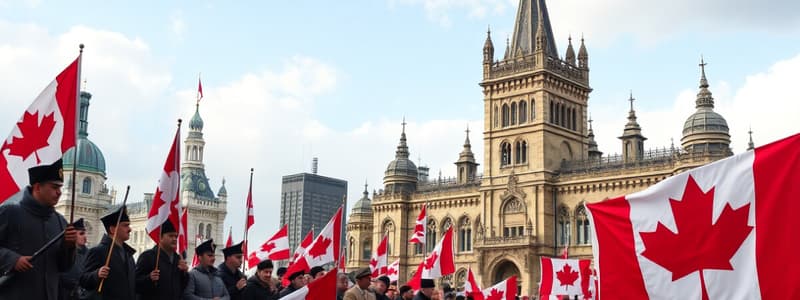Podcast
Questions and Answers
What time period is primarily discussed in the content?
What time period is primarily discussed in the content?
- 1945-2000
- 1800-1850
- 1850-1900
- 1896-1945 (correct)
What is a key concern for Quebec as mentioned in the content?
What is a key concern for Quebec as mentioned in the content?
- Achieving complete independence from Canada
- Preserving its language-related features (correct)
- Increasing immigration rates
- Economic growth in Canada
How is Canada described in relation to Quebec's autonomy?
How is Canada described in relation to Quebec's autonomy?
- As a stable entity that discourages regional differences
- As a country focused solely on linguistic unity
- As a nation actively redefining its autonomy (correct)
- As an entity that supports Quebec's independence
What aspect of Quebec is emphasized in the context of cultural preservation?
What aspect of Quebec is emphasized in the context of cultural preservation?
What might be a potential challenge for Quebec as Canada changes?
What might be a potential challenge for Quebec as Canada changes?
What year was women's federal voting rights established in Canada?
What year was women's federal voting rights established in Canada?
Which organization is associated with socialist alternatives to traditional political ideologies in Canada?
Which organization is associated with socialist alternatives to traditional political ideologies in Canada?
What was the primary concern of the Catholic Church in Quebec regarding women's suffrage?
What was the primary concern of the Catholic Church in Quebec regarding women's suffrage?
Which program was aimed at settling remote regions in Canada?
Which program was aimed at settling remote regions in Canada?
What year did the provinces grant women the right to vote in Canada?
What year did the provinces grant women the right to vote in Canada?
What was a major influence of the Church on the working class during the period discussed?
What was a major influence of the Church on the working class during the period discussed?
What was a significant outcome of the compulsory school attendance laws introduced in 1943?
What was a significant outcome of the compulsory school attendance laws introduced in 1943?
Which sector was most prominently promoted for economic independence according to the content?
Which sector was most prominently promoted for economic independence according to the content?
Why were children needed to work on farms during this period?
Why were children needed to work on farms during this period?
What was the main purpose of the ecole populaire created by the Church?
What was the main purpose of the ecole populaire created by the Church?
In 1931, the ratio of priests to followers was reported to be:
In 1931, the ratio of priests to followers was reported to be:
What type of production was emphasized by Francophone businessmen?
What type of production was emphasized by Francophone businessmen?
What role did government subsidies play in agriculture during this period?
What role did government subsidies play in agriculture during this period?
Which of the following reflects the impact of mechanization in agriculture?
Which of the following reflects the impact of mechanization in agriculture?
What was Wilfrid Laurier's approach to Canadian autonomy?
What was Wilfrid Laurier's approach to Canadian autonomy?
Which of the following was a common sentiment among English Canadians regarding immigration?
Which of the following was a common sentiment among English Canadians regarding immigration?
Who was a prominent proponent of French-Canadian nationalism?
Who was a prominent proponent of French-Canadian nationalism?
What policy did Canada adopt in relation to Indigenous Peoples?
What policy did Canada adopt in relation to Indigenous Peoples?
What was a significant consequence of the immigration policies in Canada?
What was a significant consequence of the immigration policies in Canada?
Which war did Canada participate in on a voluntary basis, showcasing their military support?
Which war did Canada participate in on a voluntary basis, showcasing their military support?
What was a defining aspect of Canadian identity during the Liberal Era?
What was a defining aspect of Canadian identity during the Liberal Era?
What was the government’s stance on the language and religion of immigrants?
What was the government’s stance on the language and religion of immigrants?
What was the purpose of creating Alberta and Saskatchewan in 1905?
What was the purpose of creating Alberta and Saskatchewan in 1905?
How did Canadian military participation in the Boer War reflect Canadian autonomy?
How did Canadian military participation in the Boer War reflect Canadian autonomy?
What was the main energy source during the second phase of industrialization in Canada?
What was the main energy source during the second phase of industrialization in Canada?
Which of the following best describes monopoly capitalism?
Which of the following best describes monopoly capitalism?
During World War I, which act granted the federal government increased powers?
During World War I, which act granted the federal government increased powers?
Which of the following was a significant impact of the First World War on Canada's autonomy?
Which of the following was a significant impact of the First World War on Canada's autonomy?
What economic theory suggested state intervention to prevent economic slowdowns during the Great Depression?
What economic theory suggested state intervention to prevent economic slowdowns during the Great Depression?
What role did women play during World War I in Canada?
What role did women play during World War I in Canada?
What were Victory Bonds used for during the First World War?
What were Victory Bonds used for during the First World War?
The Statute of Westminster (1931) was important because it granted Canada what?
The Statute of Westminster (1931) was important because it granted Canada what?
Why did the Catholic Church create Catholic unions in Canada?
Why did the Catholic Church create Catholic unions in Canada?
What economic condition prevailed due to the drop in American demand for Canadian products during the Great Depression?
What economic condition prevailed due to the drop in American demand for Canadian products during the Great Depression?
Which public health initiative aimed to improve infant health in Canada?
Which public health initiative aimed to improve infant health in Canada?
Which of the following was a major social issue in urban centers during the 1910s in Canada?
Which of the following was a major social issue in urban centers during the 1910s in Canada?
What does the term 'conscription crisis' refer to in Canada?
What does the term 'conscription crisis' refer to in Canada?
What was a key factor in the urban population increase during the Roaring 20s in Canada?
What was a key factor in the urban population increase during the Roaring 20s in Canada?
What was one of the primary factors that led to the start of World War II in Europe?
What was one of the primary factors that led to the start of World War II in Europe?
What was the impact of the War Measures Act in Canada during WWII?
What was the impact of the War Measures Act in Canada during WWII?
What was a significant economic change in Canada due to World War II?
What was a significant economic change in Canada due to World War II?
How did the conscription plebiscite reflect Canadian society during the war?
How did the conscription plebiscite reflect Canadian society during the war?
What was a major contribution of women during World War II in Canada?
What was a major contribution of women during World War II in Canada?
What financial support did the Canadian government provide to veterans after WWII?
What financial support did the Canadian government provide to veterans after WWII?
What was clerico-nationalism in the context of the Catholic Church's influence?
What was clerico-nationalism in the context of the Catholic Church's influence?
How did the role of education change during the influence of the Catholic Church?
How did the role of education change during the influence of the Catholic Church?
What was the sentiment among French-Canadians regarding conscription during WWII?
What was the sentiment among French-Canadians regarding conscription during WWII?
What was the goal of the government regarding veterans after the war?
What was the goal of the government regarding veterans after the war?
Flashcards
Quebec's Language Preservation
Quebec's Language Preservation
Efforts by Quebec to maintain its French language and cultural identity within Canada.
Cultural Features
Cultural Features
Distinctive aspects of a culture, including language, traditions, and arts.
Autonomy in Canada
Autonomy in Canada
The ability of a province, such as Quebec, to govern itself and make its own laws.
Impact of Redefinition
Impact of Redefinition
Signup and view all the flashcards
Language-Related Features
Language-Related Features
Signup and view all the flashcards
Canadian Dominion
Canadian Dominion
Signup and view all the flashcards
Wilfrid Laurier
Wilfrid Laurier
Signup and view all the flashcards
French-Canadian Nationalism
French-Canadian Nationalism
Signup and view all the flashcards
Imperialism
Imperialism
Signup and view all the flashcards
Immigration Policy
Immigration Policy
Signup and view all the flashcards
Xenophobia in Canada
Xenophobia in Canada
Signup and view all the flashcards
Francophone Rights
Francophone Rights
Signup and view all the flashcards
Residential School System
Residential School System
Signup and view all the flashcards
Canadian Military Participation
Canadian Military Participation
Signup and view all the flashcards
Creation of Alberta and Saskatchewan
Creation of Alberta and Saskatchewan
Signup and view all the flashcards
Suffragette
Suffragette
Signup and view all the flashcards
Founding of Bank of Canada
Founding of Bank of Canada
Signup and view all the flashcards
Communist Party of Canada
Communist Party of Canada
Signup and view all the flashcards
Co-operative Commonwealth Federation
Co-operative Commonwealth Federation
Signup and view all the flashcards
'Return to the Land' program
'Return to the Land' program
Signup and view all the flashcards
Second World War
Second World War
Signup and view all the flashcards
Conscription Plebiscite
Conscription Plebiscite
Signup and view all the flashcards
War Measures Act
War Measures Act
Signup and view all the flashcards
Women's Contributions in WW2
Women's Contributions in WW2
Signup and view all the flashcards
Canada's Economic Changes
Canada's Economic Changes
Signup and view all the flashcards
Clerico-nationalism
Clerico-nationalism
Signup and view all the flashcards
Impact of Catholic Church
Impact of Catholic Church
Signup and view all the flashcards
Veterans Affairs Canada
Veterans Affairs Canada
Signup and view all the flashcards
Fascism Rise in 1930s
Fascism Rise in 1930s
Signup and view all the flashcards
French-Canadian Relations
French-Canadian Relations
Signup and view all the flashcards
Lionel Groulx
Lionel Groulx
Signup and view all the flashcards
Moral and Cultural Influence
Moral and Cultural Influence
Signup and view all the flashcards
L’Action francaise
L’Action francaise
Signup and view all the flashcards
Social Restoration Programme
Social Restoration Programme
Signup and view all the flashcards
Ecole Populaire
Ecole Populaire
Signup and view all the flashcards
Consequences of Legislation
Consequences of Legislation
Signup and view all the flashcards
Francophone Economy
Francophone Economy
Signup and view all the flashcards
Agricultural Mechanization
Agricultural Mechanization
Signup and view all the flashcards
Cooperatives in Agriculture
Cooperatives in Agriculture
Signup and view all the flashcards
Compulsory School Attendance Age
Compulsory School Attendance Age
Signup and view all the flashcards
Creation of Canadian Navy
Creation of Canadian Navy
Signup and view all the flashcards
Second Phase of Industrialization
Second Phase of Industrialization
Signup and view all the flashcards
Monopoly Capitalism
Monopoly Capitalism
Signup and view all the flashcards
Labour Legislation
Labour Legislation
Signup and view all the flashcards
Strikes
Strikes
Signup and view all the flashcards
Wartime Production
Wartime Production
Signup and view all the flashcards
Greater Autonomy for Canada
Greater Autonomy for Canada
Signup and view all the flashcards
Women’s Contributions in WW1
Women’s Contributions in WW1
Signup and view all the flashcards
Conscription Crisis
Conscription Crisis
Signup and view all the flashcards
The Great Depression
The Great Depression
Signup and view all the flashcards
Keynesian Economics
Keynesian Economics
Signup and view all the flashcards
Socio-economic Problems
Socio-economic Problems
Signup and view all the flashcards
Urban Centers Growth
Urban Centers Growth
Signup and view all the flashcards
Public Health Initiatives
Public Health Initiatives
Signup and view all the flashcards
Victory Bonds
Victory Bonds
Signup and view all the flashcards
Study Notes
1896-1945 Canadian Nationalisms and Autonomy
- Canada's status within the British Empire: Canada was a dominion, dependent on the UK for external affairs.
- Two opposing ideologies: Imperialism (attachment to the British Empire, English as sole official language, Protestant religion) contrasted with French-Canadian nationalism (greater autonomy from the British Empire, promotion of French culture).
- Domestic Politics: Wilfrid Laurier was elected Prime Minister in 1896, leading a Liberal government in Quebec. Defining Canadian autonomy was a key issue.
- Impact of Immigration: Immigration led to xenophobia and tensions—especially between English and French Canadians. Some policies favoured or discriminated against certain groups.
- Canadian Military Support: Canadians participated in the Boer War (1899) but voluntarily; the Canadian Navy was created in 1910.
- Emergence of Western Provinces: Alberta and Saskatchewan were created in 1905.
- Governance of Indigenous Populations: Canadian policy largely aimed to assimilate indigenous peoples, rather than recognize their rights and cultures. Residential schools were a key element.
Second Phase of Industrialization (1900-1930)
- Key Characteristics: Hydroelectricity, gas, and oil became important energy sources; heavy industries (metallurgy, pulp and paper, etc) developed; workforce saw an increase in skilled labor.
- Resources and production sectors: Forests, mines, hydroelectric potential, and heavy industries (e.g., ore processing, pulp and paper, aluminum smelting) were crucial.
- Monopoly Capitalism: Companies controlled all stages of production and marketing to eliminate competition, meaning only one company provided a product.
- Role of the State: Limited state intervention. Governments provided grants and subsidies to attract foreign investors.
- Foreign Investment: British and American capital became important for infrastructure and factory construction in Canada. USA became chief investor.
- Foreign Trade: Canada's important trade partners included the USA and Great Britain.
- Union Movement: Canadian workers increasingly joined American and Catholic Unions, facing challenges in gaining recognition from employers.
First World War (1914-1918)
- European Context: Canada joined the war due to ties with the British Empire.
- Wartime Government: The War Measures Act gave the federal government greater power in the social, economic, and provincial spheres.
- Wartime Production: Factories significantly increased production of military equipment, strengthening Canada's economy.
- Military Forces: Important engagements (like the Battle of Vimy Ridge) involved Canadian troops, particularly the 22nd Battalion, a French-Canadian unit.
- Financial Resources: Victory bonds and income tax were vital for funding the war effort.
- Women's Contributions: Women filled labor shortages in factories.
- Conscription Crisis: Compulsory enlistment caused division between English- and French-speaking Canadians.
- Soldier Repatriation: Government policies were implemented to assist returning soldiers in reintegrating into Canadian society.
Greater Autonomy for Canada
- League of Nations: Canada signed the Treaty of Versailles and had its place within the League of Nations.
- Statute of Westminster (1931): British Parliament granted Canada almost complete autonomy.
- Urban Centers: Rapid urban growth occurred alongside overcrowded and unsanitary conditions.
- Public Health: Initiatives improved sanitation, such as water chlorination, vaccinations, and milk pasteurization.
- Public Services: Sewers, garbage collection, police, fire departments and public transportation were critical.
- Infrastructure: Road networks, parks, and bathhouses improved.
The Great Depression (1929-1939)
- Stock Market Crash (1929): This triggered a period of significant economic hardship, including a rapid loss in stock value.
- Socio-economic Problems: Canada, like much of the world, experienced declining exports and a drop in manufacturing production, increasing unemployment and poverty.
- Federal and Provincial Measures: Government policies such as direct relief and the creation of the Bank of Canada were introduced to address the problems.
- Colonial Programs: The "Return to the Land" program was introduced, which aimed to repopulate rural regions of Canada by encouraging people to move there and farm.
- Challenging Capitalism: During this era, new political ideologies, such as Keynesian economics, challenged traditional capitalist ideologies.
Second World War (1939-1945)
- European Political and Economic Climate: The global economic climate deteriorated alongside the rise of fascism and militarism.
- Wartime Government: Canada declared war on Germany in September 1939. A key component was the War Measures Act, which increased federal powers.
- Wartime Production: Transformation of factories to meet military needs occurred, including the production of uniforms, weapons, and ammunition.
- Canadian Contributions: Canadian men enlisted in the military. Women played a significant role in factories. The war aided the end of the Great Depression.
- Demobilization: Efforts were undertaken to support returning soldiers and transition them back to civilian life.
Influence of Catholic Church (1896-1945)
- Clerico-Nationalism: Nationalism connected to rural life, traditional values, and protection of French culture.
- Moral and Cultural Influence: Church influence played a strong role in Canadian culture, including support of conservative political parties, education, and health.
- Religious Personnel: The ratio of priests to parishioners was significantly high at this time.
- Cooperatives: The Church spurred cooperatives for financing of industrialization and agricultural production
- Education and Technical Training: Church involvement in education varied, impacting attendance and school development. School attendance rates were higher for Anglophone children.
- Legislation: The establishment of compulsory school attendance laws are examples of government responses to the church's influence.
Studying That Suits You
Use AI to generate personalized quizzes and flashcards to suit your learning preferences.




